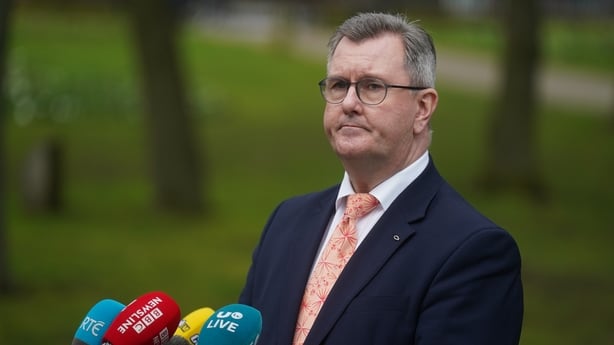After more than three decades in journalism, there are few stories that have a real wow or shock factor.
A story that is unlike anything that has gone before.
However, that’s precisely what happened on Good Friday, 29 March 2024.
In a live broadcast on RTÉ’s One O’Clock news that day, I reported that Jeffrey Donaldson had stepped down as DUP leader and been suspended from the party after being charged with historical sexual offences.
Legal clearance to name the former Lagan Valley MP had been given literally just seconds before we went on air.
RTÉ’s lawyers, like those working for the BBC, Sky News and many other media outlets had been deliberating over draft scripts about what was a sensational, but legally risky story.
Speculation that something big was about to break had been circulating from early morning after it was reported that Mr Donaldson’s social media accounts had been deactivated.
Then the PSNI issued a statement saying a 61-year-old man, the same age as the then DUP leader, had been arrested and charged with historical sexual offences.
Confirmation came shortly before 1pm in the form of a DUP statement saying the party chairman had received a letter from Mr Donaldson confirming that he had been charged with allegations of a historical nature and was stepping down as DUP leader with immediate effect.
There are huge legal issues around naming someone facing allegations of sexual offences, but there was clearly a huge public interest case for naming in this case.
Around two minutes before going on air, I was asked by news presenter Eileen Whelan if I was in a position to name Mr Donaldson.
I said I wasn’t as I had not received legal clearance.
I had two versions of the story in my hand, one naming Jeffrey Donaldson and outlining what had happened, the other a more generic script referring to a major development within the DUP but not naming its then leader or outlining the allegations against him.
I asked for urgent clarification.
Just after being advised that it was 20 seconds to air the voice of RTÉ’s Chief News Editor Michael O’Kane filled my earpiece.
“It’s a go,” he said. “Name him.”
Eileen Whelan was then able to name Jeffrey Donaldson in the introduction to my live segment and I was able to report his resignation from the party and what the DUP had revealed about the allegations against him.
There was a sense of disbelief when I came off air around 90 seconds later.
The story dominated television screens, radio programmes, newspapers and social media for days.
A range of journalists I spoke to at that time all had the same reaction, that this was a story no one could possibly have seen coming.

Since then Mr Donaldson has pleaded not guilty to 18 sex offence charges, including one count of rape, four counts of gross indecency and 13 charges of indecent assault against two alleged victims.
His wife and co-accused Eleanor Donaldson has pleaded not guilty to three charges, including aiding and abetting, and her defence team has made an application to have two other charges withdrawn.
The couple are due to stand trial in March.
A jury will determine whether they are innocent or guilty, but whatever the verdict his resignation and the circumstances surrounding it marked a stunning fall from grace for someone who at the time was widely regarded as one of unionism’s most articulate, astute and successful leaders.
Just weeks before his arrest and questioning Jeffrey Donaldson had been feted in Washington during the annual St Patrick’s Day festivities for leading his party back into Stormont after two politically turbulent years.
He had faced down many internal and external critics to persuade his party to end its boycott of power-sharing, which he had triggered as part of the DUP’s protest at post-Brexit trade arrangements.
The Donaldson deal and his efforts to promote it were viewed by many as his finest hour.
After months of being accused of dithering by political rivals and some within the British and Irish governments, he surprised everyone by going on the front foot, aggressively taking on his critics and heralding the agreement reached with the British government as the best possible outcome.
He seized every available media opportunity to advance the merits of his deal and debunk his critics.
When Stormont was restored on 3 February, it was widely regarded as a success for Mr Donaldson.
Many political rivals privately acknowledged that his passion for the deal and eagerness to sell it had surprised them.
Eleven months later, the devolved administration at Stormont continues to function, having withstood the political shockwaves from his demise.
Jeffrey Donaldson will once again return to the media spotlight in March, but this time he will be in the dock and 12 jurors will determine his fate.
Another sentence I never thought I’d write.
